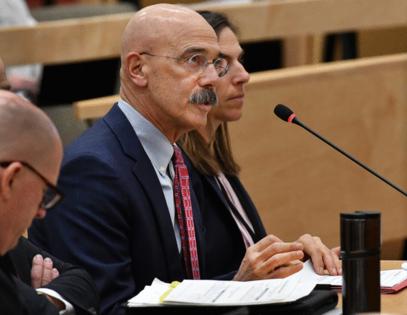Trump's 'One Big Beautiful Bill' could see Massachusetts lose $650M in tax revenue
Published in News & Features
Massachusetts could lose out on $650 million in state revenue because of the tax breaks and spending cuts bill President Donald Trump signed over the summer, a massive budget shocker that could leave Beacon Hill Democrats scrambling to plug holes.
The revelation that Bay State budget writers could have more than half a billion less than originally projected to work with this fiscal year comes weeks before they must confirm or revise revenue expectations, and as the federal government sits on the precipice of a shutdown.
Department of Revenue Commissioner Geoffrey Snyder said the “One Big Beautiful Bill” changes over 100 provisions in the federal tax code and about 30 will trigger an impact on collections in Massachusetts.
“Overall, we project that the (One Big Beautiful Bill) will reduce state tax collections by more than $650 million in fiscal year 2026,” Snyder told budget writers Tuesday afternoon at an economic roundtable in the State House. “Because it was enacted on July 4, the impact was not captured in FY26’s full fiscal year revenue benchmark of $43.6 billion.”
House budget chief Aaron Michlewtiz said the prospect of losing $650 million “at any point in time is significant and daunting, to say the least, for us as budget writers to figure out what to do with.”
Gov. Maura Healey has warned for months that Massachusetts could face financial hardships because of Trump’s “One Big Beautiful Bill,” which he signed into law the same day Healey approved a $61 billion state budget for fiscal year 2026.
The first-term Democrat has sought to expand her budget-cutting powers ahead of potential economic headaches this fiscal year. She also delayed payments for local projects, and even warned lawmakers that her administration would slash local spending if the economy tanked.
Lawmakers grappled Tuesday with whether and by what extent they should decouple Massachusetts tax codes from federal standards, a move that might lessen the impact of the federal bill Trump signed in July.
Senate budget chief Michael Rodrigues said linking federal and state tax codes is good because it simplifies tax filing for residents and businesses. But it can be dangerous, he said, “in situations like when the federal government does these big tax changes.”
“Remember, that has a direct impact on our revenue,” the Westport Democrat told reporters. “It has an impact on federal revenue. But they really don’t care, because if their revenue numbers fall short, they just print more, right? … We can’t print more money like the feds.”
Healey and legislative budget writers left about $800 million in anticipated revenues unspent in the fiscal year 2026 budget in case federal policy decisions created a challenging economic environment for the state.
But whether the $800 million will absorb the $650 million in lost revenue as a result of the “One Big Beautiful Bill” is unclear, and it is still not a guarantee that Massachusetts will even collect enough tax revenue this fiscal year to create the cushion as lawmakers intended.
Administration and Finance Secretary Matthew Gorzkowicz said that how the roughly $800 million will be used if it is collected “has yet to be decided.”
“There are many competing interests that have to be considered when thinking about how to apply that,” he said.
Michlewitz said the state officials do not yet have the $800 million in hand.
“That’s got to get collected over the fiscal year for it to work,” he said. “It’s what we’re budgeting for, but we still have to go through the fiscal year to have an understanding of what the final number will be.”
Tax collections in fiscal year 2025 came in about $2.1 billion, or 5%, above projections set by Healey’s budget-writing office and state lawmakers, Snyder said. The year-over-year increase was mostly driven by a 4% surtax on high earners and capital gains taxes, Snyder said.
Fiscal year 2026 tax collections through August totaled about $5.5 billion — $175 million or 3.3% more than this time last fiscal year, Snyder told budget writers. July and August are two of the smaller months because neither individuals nor businesses make significant estimated payments, according to Snyder.
“September is the first significant month in the fiscal year, and as of Sept. 25, collections are showing little to no growth versus last year,” Snyder said.
Whether Massachusetts will meet fiscal year 2026 revenue projections is still an open question, and Bay State Budget writers face an Oct. 15 deadline to revise or certify how much cash the state is expected to bring in by the end of June 2026.
Gorzkowicz did not say if the Healey administration plans to adjust revenue projections like January 2024, when officials downgraded expectations for fiscal year 2024 by $1 billion and unilaterally slashed $375 million in spending from the state budget.
“We know we have a decision to make by Oct. 15, which is when I have to certify revenues are sufficient to meet expenditures, and we’ll evaluate it all and have an answer then,” Gorzkowicz said.
Gorzkowicz also did not offer an update on whether the Healey administration planned to cut cash for local earmarks.
“We communicated early on with leadership in both the House and Senate that we were going to hold off on paying out earmarks until we understood what the first quarter of the fiscal year looked like. We’re now receiving those numbers, and we’ll evaluate those once we have them, those being the September numbers,” he said.
________
©2025 MediaNews Group, Inc. Visit at bostonherald.com. Distributed by Tribune Content Agency, LLC.







Comments